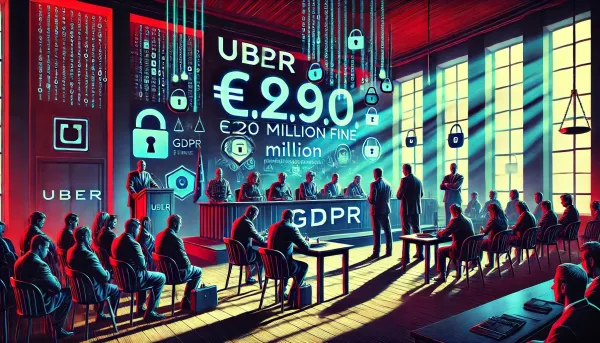
Uber's €290M Fine: A Data Compliance Wake-Up Call
The recent €290 million ($324 million) fine imposed on Uber Technologies Inc. by the Dutch Data Protection Authority (DPA) highlights the persistent challenges that organizations face in navigating the complexities of data protection regulations, particularly the General Data Protection Regulation (GDPR) in the European Union (EU). This landmark case highlights the repercussions of non-compliance amid a dynamic regulatory environment and serves as a catalyst for organizations worldwide to reassess their cross-border data transfer practices.
Background on the Violation
The fine stems from Uber’s transfer of sensitive personal data of European drivers to the United States without adhering to the necessary safeguards. Specifically, the DPA criticized Uber for failing to utilize appropriate transfer mechanisms, especially after the invalidation of the EU-U.S. Privacy Shield framework in 2020 by the Court of Justice of the European Union, which ruled that U.S. data protection is not equivalent to EU standards.
Uber’s data handling practices included storing a wide range of sensitive information, such as location data, identity documents, payment details, and, in some cases, criminal and medical records for a span of over two years on servers based in the U.S. The DPA’s inquiry was initially incited by complaints from more than 170 French drivers, underscoring the importance of collective action in data protection advocacy.
Deep Dive into GDPR Regulations
Article 44 - Data Transfers to Third Countries
GDPR Article 44 explicitly prohibits data transfers to third countries unless the recipient jurisdiction ensures an adequate level of protection for personal data. This provision is critical for maintaining data subject rights and freedoms. The lack of Standard Contractual Clauses (SCCs) implemented by Uber during the transfer process rendered the transmission of data illegal under EU law.
The Role of the Data Protection Authority
The Dutch DPA’s findings not only addressed Uber’s failures but also underscored the regulatory body’s responsibility to enforce GDPR compliance rigorously. The authority has issued multiple fines against Uber over the years, indicating a pattern of non-compliance with EU data protection standards. Previously, Uber was fined €600,000 for shortcomings in data access controls and €10 million earlier this year for opaque data management practices.
Uber’s Arguments and Appeals
In response to the ruling, Uber has characterized the decision as “completely unjustified,” and plans to appeal the DPA’s judgment, stating that it believes its cross-border data transfers were compliant with GDPR during a tumultuous period of regulatory uncertainty. Uber argues that since drivers directly provide their information to the application, it does not qualify as a data transfer under GDPR definitions.
Appeal Process and Implications
The appeal could extend the duration of this legal struggle for up to four years, during which the penalization will be suspended. Such prolonged engagement exemplifies potential delays in accountability and restitution for data protection infringement.
Comparative Insights: Other Regulatory Actions
Uber’s case is not an isolated instance but part of a broader trend where U.S. companies face scrutiny under GDPR. In July 2023, the Swedish Authority for Privacy Protection fined several organizations $1.1 million for transferring data to the U.S. without sufficient safeguards, following similar themes of inadequate protection mechanisms and compliance failures. Additionally, in 2022, the Austrian and French regulators ruled the use of Google Analytics to be in breach of GDPR, reiterating the need for effective data protection strategies.
The Future of Transatlantic Data Transfers
With the introduction of the EU-U.S. Data Privacy Framework in July 2023, organizations are expected to rigorously align their data handling procedures with the stipulated guidelines to avert costly penalties. However, ongoing skepticism regarding U.S. data protection measures will necessitate continuous vigilance and adaptation from organizations operating across borders.
Conclusion
Uber’s significant fine serves as a stark reminder about the importance of compliance with the GDPR, particularly for organizations managing large volumes of sensitive personal data. As data protection laws evolve, organizations must remain proactive in seeking legal guidance and leveraging robust data protection frameworks to ensure compliance. Frequent audits, clear data transfer protocols, and transparent privacy policies are essential to safeguarding personal information and maintaining trust in today’s increasingly sensitive data landscape.